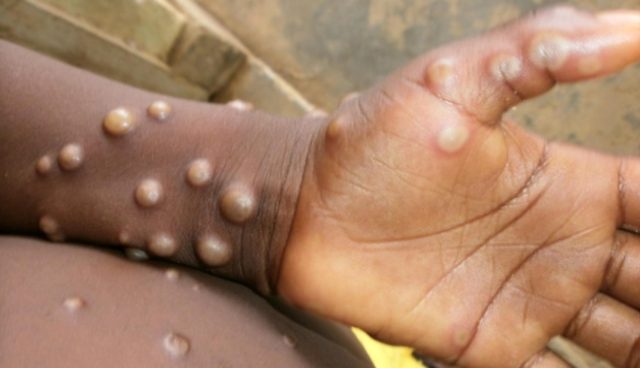One more MPOX case has been recorded in the Greater Accra Region, bringing the number of cases recorded in recent time to 3.
According to the Ghana Health Service (GHS), the identified contacts are currently being monitored.
The Deputy Director of Public Health in charge of Disease Surveillance at the GHS, Dr. Dennis Laryea tells 3news the case was recorded last week.
Ghana reported its first case in August in the Western Region, identifying 25 contacts. Following the confirmation the mother of the first case also tested positive which brought the country’s case count to two (2) as of Thursday October 31.
The latest case in the Greater Accra Region, according to the health authority, remains an indication that they are on alert.
“There was one case confirmed in the Greater Accra Region. The region has done their investigations so far. We haven’t identified any new case even amongst the contacts, but we’re still following the map to determine if anybody develops symptoms. I don’t have the figures for the contacts off head, but the case was confirmed last week.
Our surveillance system is always active, and so we always look out for these diseases. It’s just that when an outbreak comes, then we start talking about them, but we are always constantly looking for them. And if I open our database, until this year, we’ve had quite a number of them and two suspected cases I should say. And once, in fact, I think even when we issued the press release of the outbreak in the Western North Region, we gave indication of how many suspected cases we’ve had country wide.
And I think that that caused some confusion, because people assumed that it was over a short period, but the surveillance system is constantly on alert, looking for these diseases. And MPOX is just one of them. So, there are so many, cholera, yellow fever, measles, COVID, we’re still doing surveillance or for COVID, but we don’t talk about it. So when there are outbreaks, that’s the only time we hear about them.’’ He explained.
According to Dr Laryea, the Regional Health Directorate is working with the district concerned to make sure that they’ve been able to follow up all the contacts and nobody has developed symptoms.
“As I said, sometimes when you confirm these cases, you want to be double sure that there are the others out there that we haven’t picked. So, the region is working with the district concerned to make sure that they’ve been able to follow up all the contacts and nobody has developed symptoms.’’ Dr Laryea explained further.
He also encouraged the general public to be watchful and avoid close contact with persons with any kind of rashes while encouraging early reporting to health facilities.
“I think, with MPOXs, we indicated that it’s close contact, so even skin to skin contact can spread it. If somebody has MPOX and lesions, discharges from the lesions are in persons, clothing or beddings, and somebody comes into contact with those as well, the person can get it.
Of course, there are also sexual means of transmission, but that’s also another way. But the main one for us is a person to person contact, physical contact. So it’s important that people understand this and make sure that if anybody starts developing any form of rash. The thing with Mpox is that at various stages, the rashes look like other rash caused by other diseases.
So, for example, at some stage it will look like measles. At some stage it might look like chicken pox, and then at some stage they will look like the MPOX itself. Because there’s no way for the average person to be able to tell whether this is MPOX or not, it’s important that once we’re observing the rash, we will go to a health facility, and then once the diagnosis is made, the necessary precautions can be taken.”
Following the declaration of the highly infectious disease MPOX by the WHO as a public health emergency in Africa, in August, more than 17,000 cases have been confirmed across the continent with the Democratic Republic of Congo accounting for 96 per cent of all cases in Africa.
The United Kingdom confirmed its first case on Wednesday October 30. The outbreak comes as a new strain is identified, named clade 1b, said to be spreading mainly through sexual intercourse.
Read also:
Cholera outbreak spreads to 17 districts – Ghana Health Service


















